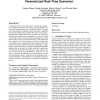Free Online Productivity Tools
i2Speak
i2Symbol
i2OCR
iTex2Img
iWeb2Print
iWeb2Shot
i2Type
iPdf2Split
iPdf2Merge
i2Bopomofo
i2Arabic
i2Style
i2Image
i2PDF
iLatex2Rtf
Sci2ools
SCESM
2006
ACM
2006
ACM
Nobody's perfect: interactive synthesis from parametrized real-time scenarios
As technical systems keep growing more complex and sophisticated, designing software for the safety-critical coordination between their components becomes increasingly difficult. Verifying and correcting these components already represents a significant part of the development process both with respect to time and cost. Scenario-based synthesis has been put forward as an approach to accelerate the transition from requirements to a correct, verified model. In [8], we have presented a synthesis technique for deriving pattern behavior from a set of timed scenarios with parametrized time constraints. The derived patterns can then be verified using our technique for the compositional formal verification of Mechatronic UML models as introduced in [10]. In this paper, we argue that the practical relevance of a synthesis technique predominantly depends rather on its ability to identify and point to specification errors than the complexity of the scenarios it could, in theory, process, p...
| Added | 14 Jun 2010 |
| Updated | 14 Jun 2010 |
| Type | Conference |
| Year | 2006 |
| Where | SCESM |
| Authors | Holger Giese, Stefan Henkler, Martin Hirsch, Florian Klein |
Comments (0)

